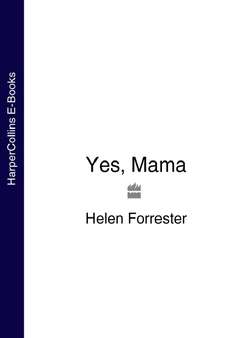Читать книгу Yes, Mama - Helen Forrester - Страница 31
II
ОглавлениеWrapped in a black woollen shawl, her straw hat skewered by two huge hatpins to the top of her plaited hair, Polly ran through the ill-lit city. Though she was by no means young she was nervous in the Woodmans’ neighbourhood of being cornered by half-drunk, smartly dressed men out for an evening’s entertainment; further into the city itself, prostitutes paraded followed closely by their pimps, all of them anxious to defend their own particular territory. As she cut through side streets to reach her home near the junction of Scotland Road and Cazneau Street, homeless men dozing in doorways called to her, and an occasional group of seamen on shore leave shouted after her. She gave them all wide berth.
The narrow street off which the court led was almost dead dark, and she feared she might not find the entrance. As she passed, she let her fingertips brush along the rough brick wall, watching that she did not trip over front steps which occasionally protruded on to the pavement.
A slight difference in the light and nothing under her fingertips told her that she had found the narrow archway.
As she entered, the smell hit her, the appalling reek of the midden full of a month’s rubbish and the overflowing earth lavatories. Very faintly, from the steps leading down to the cellar, came the glow of a candle. She walked lightly towards it, afraid of slipping on the cobblestones, greasy from half a century of filth. Then she ran down the narrow outside staircase and into the room.
Though there were only three of them, the cellar seemed full of women, wrapped in their black, crocheted shawls, all watching tearfully, as her mother on her straw mattress muttered softly. The light of the solitary candle barely reached her father, who was pacing up and down a narrow space by the fireplace. He was beating his breast with one clenched fist, in time to the movement of his feet. Crouched on another palliasse laid on the floor, his head against the wall, Billy dozed, his tousled hair shadowing his face.
Polly’s quick footsteps on the stairs woke the boy, and all heads turned towards her.
Polly had eyes only for her mother, and the women edged back as she ran to the narrow bed and flung herself on her knees by it. ‘Holy Mary!’ she breathed, as she saw the black-encrusted mouth and the frightening staring eyes. She laid her arm round her mother’s head and whispered, ‘Mam.’
Bridie ignored her, and continued to toss and mutter with an occasional near shout.
Polly looked round wildly. ‘Aunty! Aunty Kitty, what’s to do with her? Can’t you do somethin’?’
Perched on her stool like a roosting crow, her great-aunt said heavily, ‘I think it’s gaol fever.’
Polly drew back from the bed in horror. ‘Has anybody bin to the Dispensary to ask the doctor?’
‘Billy’ll go as soon as it’s light – mebbe somebody’ll be there.’ She looked down at the terrified girl. ‘You come away from ’er, duck. You can’t do nothin’, and you might catch it.’
Mary let out a sudden wail, ‘Aye, we’ll all die unless we’re lucky – and our Billy wouldn’t come over and ’ave hisself washed and ’is clothes boiled.’
‘Now, Mary, don’t take on so. Time enough for that later.’ This from Mrs Fox, Bridie’s distant kinswoman and the family’s landlady, who, to her credit, had come down from her ground floor room to see if she could help.
But Bridie was beyond help. She died before midnight in the arms of her old aunt, her half-nourished body unable to withstand the ravages of the terrible disease.
In the first light of morning, as they listened to the unearthly sound of keening coming from the Tysons’ cellar, her Catholic neighbours formed an uneasy knot on the far side of the court; occasionally, one or the other of them would cross themselves.
They whispered questions to each other, and, finally, a woman ran across to the iron railing guarding the cellar steps. She leaned over. Great-aunt Kitty was sitting exhausted on the bottom step, and she asked her, ‘What’s to do?’
The old woman looked up and replied, without hesitation, ‘Typhus, I reckon. It’s our Bridie, dead from typhus.’
The woman flung her hands across her chest, as if to protect herself, her face a picture of horror. ‘Jaysus, save us!’ she screamed.
At her shriek, panic went from face to face. People not yet up leapt from their palliasses to the windows and flung them up, as the woman turned and spread the news. Nobody came near the cellar, tending instead to bunch themselves in the far corners of the foetid yard and draw comfort from excited talk with each other.
James wept unrestrainedly, not only because he had lost his wife, but also because she would have to be given a pauper’s funeral, the last great humiliation.
‘’Aven’t even got a sheet to wind her in,’ he sobbed bitterly. ‘Will they ’ave to strip ’er?’
‘Aye, for their own safety, they’ll have to take everything of ours off ’er and burn it,’ Great-aunt Kitty told him. ‘They’ll bring a shroud, though.’
